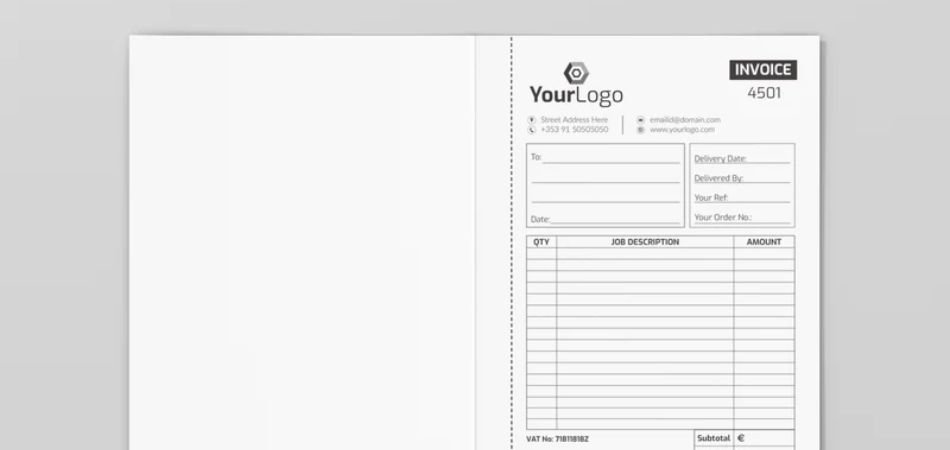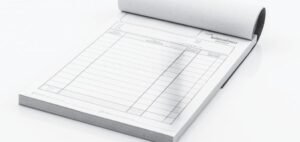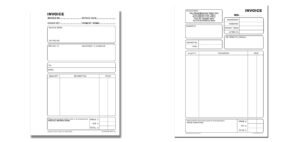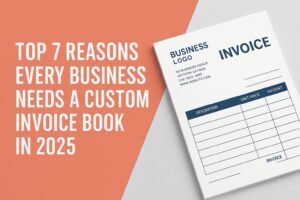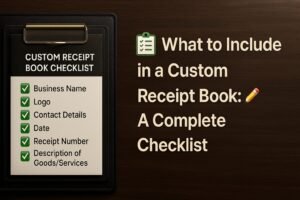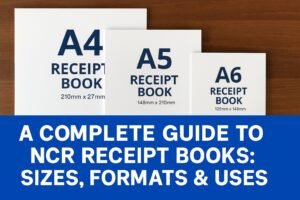Custom invoice books are essential tools for businesses to manage financial transactions, consisting of multiple NCR paper sets bound together, allowing for easy duplication of invoices.
They usually measure 210mm x 297mm (A4) and 148mm x 210mm ( A5 ) in size and can be personalised with the business name, logo, and contact information.
Custom invoice books help businesses maintain a professional appearance, streamline financial records, and improve overall efficiency.
Order your custom Invoice books here with DiscoverPrint
What are custom invoice books used for?
Custom invoice books serve various purposes for businesses in numerous industries. Some of their primary uses include:
- Record keeping: Custom invoice books allow businesses to maintain accurate records of financial transactions, ensuring proper documentation for tax and accounting purposes.
- Branding: Personalising invoice books with your company’s logo and information reinforces brand recognition and professionalism.
- Easy duplication: Carbonless copy paper sets enable businesses to create multiple copies of invoices effortlessly, providing records for both customers and internal use.
- Organised invoicing: Custom invoice books help businesses stay organised, making it easier to track and manage invoices.
Also Read: What Should Not Be On A Business Card?
What should be included in a custom invoice book?
A well-designed custom invoice book should include the following elements:
- Business name and logo: Incorporate your company’s name and logo prominently to establish brand recognition and professionalism.
- Contact information: Include your business address, phone number, email, and website, ensuring easy access to your contact details.
- Invoice number: Each invoice should have a unique reference number for easy tracking and organisation.
- Product or service description: Provide a clear and detailed description of the products or services being invoiced, including quantities, prices, and any applicable taxes.
- Payment terms: Specify the payment terms and methods accepted to ensure a smooth transaction process.
Are custom invoice books still relevant?
In the era of digital invoicing and accounting software, custom invoice books continue to be relevant and valuable tools for businesses.
While electronic invoicing is increasingly common, many businesses still require physical copies for certain transactions or as a backup.
Custom invoice books help maintain professionalism, organisation, and accurate financial record-keeping.
Also Read: What Is A Duplicate Invoice Book?
Custom invoice books are widely used across various industries and businesses, but some sectors rely on them more heavily due to the nature of their work or the need for physical documentation.
Some of the most common industries and businesses that use custom invoice books include:
- Small and medium-sized businesses (SMBs): These businesses often prefer using custom invoice books as they provide a cost-effective and straightforward method for maintaining financial records and invoicing clients.
- Construction and trade services: Contractors, electricians, plumbers, and other tradespeople often use custom invoice books to issue invoices on site and provide clients with immediate documentation for services rendered.
- Retail and wholesale businesses: Many brick-and-mortar stores, as well as wholesale distributors, use custom invoice books to provide customers with receipts for purchases or to issue invoices for larger transactions.
- Hospitality industry: Restaurants, cafes, and bars often use custom invoice books for bill management and to provide patrons with itemised receipts.
- Service industries: Businesses offering professional services, such as accountants, lawyers, consultants, and freelancers, use custom invoice books to issue invoices for their services.
- Medical and healthcare: Clinics, pharmacies, and other healthcare providers may use custom invoice books to bill patients for consultations, treatments, or medications.
- Automotive industry: Repair shops, mechanics, and dealerships often use custom invoice books to provide customers with an itemised list of services, parts, and labour costs.
- Transport and logistics: Courier services, moving companies, and freight carriers may use custom invoice books to provide clients with detailed information about shipments and associated charges.
- Event planning and management: Event organisers and service providers, such as caterers, photographers, and decorators, use custom invoice books to bill clients for their services.
- Non-profit organisations: Charities and other non-profit organisations may use custom invoice books to issue receipts for donations, fundraising events, or services provided.
These are just a few examples of industries and businesses that rely on custom invoice books to manage financial transactions and maintain professional records.
Their versatility and ease of use make them a valuable tool for many types of businesses.
Our other amazing products to order online: NCR Pads & Floor stickers
